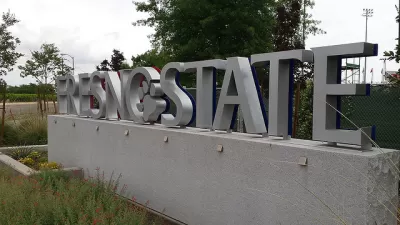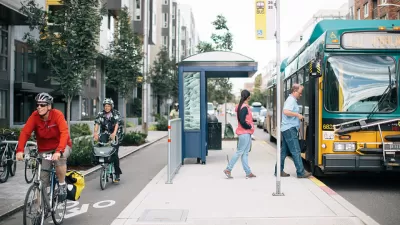Fresno State University in California has released plans for a suite of changes that will redefine its approach to transportation—away from a devout focus on cars and toward more transportation options.

James Sinclair writes about the efforts of Fresno State University in California to shift its transportation focus away from parking and cars toward a more multi-modal community. Sinclair's post begins by describing the land use context of the city of Fresno, located in an expansive part of California's Central Valley that has seen waves of urban and suburban development.
Despite the city's transition away from the agricultural setting of its past, Fresno State has "operated as a car-campus, and made no efforts to change that," writes Sinclair. His analysis of those efforts includes a look at collision data from around the campus and references to earlier posts critiquing developments and plans.
Yet in the current post, Sinclair is able to report a new direction for the university's transportation strategies:
Anyway, after apparently conceding that you can't build your way out of congestion and parking demand, it looks like change has finally arrived at Fresno State. And not just a small change: a wave of changes meant to encourage alternative modes of transportation, all happening within the past 6 months.
Sinclair breaks down each of these specific points of action by Fresno State in much more detail in the post:
- New campus shuttle bus
- Partnerships creating bus service to Visalia and north to Yosemite
- Free bus passes on FAX and Clovis Stageline for all students and staff
- Scramble crosswalk on Cedar
- Bicycle barns (secure bicycle parking)
- Bicycle maintenance stations
- High quality Active Transportation Master Plan prepared by Alta
Hat tip to Angie Schmitt at Streetsblog USA for sharing Sinclair's post.
FULL STORY: Fresno State Finally Gets Serious About Non-Car Transportation!

Planetizen Federal Action Tracker
A weekly monitor of how Trump’s orders and actions are impacting planners and planning in America.

Congressman Proposes Bill to Rename DC Metro “Trump Train”
The Make Autorail Great Again Act would withhold federal funding to the system until the Washington Metropolitan Area Transit Authority (WMATA), rebrands as the Washington Metropolitan Authority for Greater Access (WMAGA).

The Simple Legislative Tool Transforming Vacant Downtowns
In California, Michigan and Georgia, an easy win is bringing dollars — and delight — back to city centers.

The States Losing Rural Delivery Rooms at an Alarming Pace
In some states, as few as 9% of rural hospitals still deliver babies. As a result, rising pre-term births, no adequate pre-term care and "harrowing" close calls are a growing reality.

The Small South Asian Republic Going all in on EVs
Thanks to one simple policy change less than five years ago, 65% of new cars in this Himalayan country are now electric.

DC Backpedals on Bike Lane Protection, Swaps Barriers for Paint
Citing aesthetic concerns, the city is removing the concrete barriers and flexposts that once separated Arizona Avenue cyclists from motor vehicles.
Urban Design for Planners 1: Software Tools
This six-course series explores essential urban design concepts using open source software and equips planners with the tools they need to participate fully in the urban design process.
Planning for Universal Design
Learn the tools for implementing Universal Design in planning regulations.
Smith Gee Studio
City of Charlotte
City of Camden Redevelopment Agency
City of Astoria
Transportation Research & Education Center (TREC) at Portland State University
US High Speed Rail Association
City of Camden Redevelopment Agency
Municipality of Princeton (NJ)





























